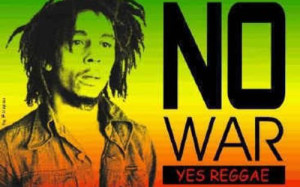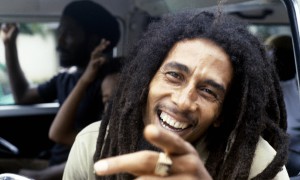| Find Them All on Amazon | |
| 1 | Concrete Jungle |
| 2 | War |
| 3 | Redemption Song |
| 4 | Exodus |
| 5 | Get Up, Stand Up |
| 6 | Three Little Birds |
He was born with the name Robert Nesta Marley in a secluded Caribbean village as a son of a white father and a black teenage girl. He went to Kingston with the hope of a musical career at the age of fourteen, where Joe Higgs, the father of reggae took him under his wings.
He brought together the Wailers band, in which two other legends of the genre, Peter Tosh and Bunny Livingston also played music alongside Marley. Although they had some local successes, they did not get too far, so they decided to break up in 1966. Along with the dissolution.
Marley got married, he worked half a year in an American car factory, then returned home to reform the Wailers. He began to research the spiritual roots of reggae and reached the Rastafarian sect of Ethiopian origin that saw Haile Selassie, the Ethiopian Emperor as a savior.
His life, his personality changed: not only he began to wear distinctive curls (dreadlocks), but he returned to the African roots, years ahead of the ‘African-American’ revival in the United States. The Wailers not only wanted to entertain, but also stood up for the oppressed and the poor, sang about faith and freedom, including also the freedom of smoking marijuana.
The Wailers first album published outside of Jamaica appeared in 1973. Marley’s name became recognized in the next year, when Eric Clapton adapted the song “I Shot the Sheriff”.
The Wailers could perfrom together on stage with Sly and the Family Stone before the American audience in 1974, but after a few occasion they were kicked out of the tour: they seemed to be much more successful than the main attraction.
Not much later Tosh and Livingston left the band in the hope of a solo career (both of them became successful but not as much as Marley, Tosh was gunned down in 1987 in still unclear circumstances). Marley went on with new musicians, his wife, Rita joined the vocal too.
1975 His Natty Dread album was released in 1975, No Woman, No Cry can be heard on it, while after a year the Rastaman Vibration has also achieved a prominent place on the US list. He gave sold out concerts, made a lot of LP’s, he was considered as a Star, in Jamaica, however, even more: a living legend, a prophet, the nation’s voice.
Taking advantage of his popularity he strived to reconcile the opposing politicians in his anarchical country, there was also an attempt of assassination against him because of this. The musician still spoke on the voice of peace, and finally managed to get the old opponents to hold out an olive branch publicly on a Marley concert.
Excellent albums followed (Exodus, Kaya, Babylon By Bus, Survival), he played on stage in an ecstatic state of mind and his pulsating music captivated the audience. He was preparing for a US tour in the spring of 1981 when he collapsed while he was jogging in New York’s Central Park, the medical examination revealed that he had cancer, the disease spread to his brain, his lungs and his liver as well.
Barely 36, he died on May 11,1981. His burial was followed by a national mourning and he received a decorated grave in Kingston, where he has a museum also. His music is still alive, his son Ziggy, carries on his legacy, his songs are remastered again and again, but the original version of Redemption Song, Get Up, Stand Up, One Love, and Is This Love is the best.
Marley got into the Rock Hall of Fame, even decades after his death he is still among the highest paid celebrities, and the first global marijuana brand bears his name which they want to first sell in US federal states legalizing cannabis, than worldwide.
His first European sculpture was erected in Banat, Diószegpuszta (Banatski Sokolac) in 2008. His seventieth birthday was remembered with concerts around the world, in Jamaica he was saluted with a month-long event series.
Let’s investigate the six best songs of this astonishing rastaman:
6. Three Little Birds
“Don’t worry about a thing,
‘Cause every little thing gonna be all right.
Singin’: “Don’t worry about a thing,
‘Cause every little thing gonna be all right! ”
This is one of Bob’s most optimistic songs calling us to let go all of our worries and troubles. It’s childlike naivety and serenity cajole us. The lyrics rocks us into a comfortable dream world, where nothing really matters.
Does this world exist somewhere, or it remains for our imagination? Or is it our state of mind that influences the conditions of our reality? Anyway, Bob’s attitude is quite flimsy! This is a typical song which I could imagine to be played in a kindergarten or a school.
https://www.youtube.com/watch?v=PGYAAsHT4QE
5. Get Up, Stand Up
This song is a more militant, revolutionary piece, a real anthem of Rastafari encouraging to rebel against official religion and it’s representatives (“Preacher man don’t tell me, heaven is under the earth; I know you don’t know, what life is really worth”).
Get Up Stand Up is a timeless opus about the saga against the all-time oppressors of mankind, no matter if they wrap themselves beyond the notions of state, church, government, or any -ism: communism, capitalism, socialism, realism, dadaism or whatever.
4. Exodus
This is Bob Marley’s most religious song, perhaps we may even call it his key work. He adapts the ancient biblical story of Moses (the exodus from Egypt) to the current situation of the rastas. He perceives their dwelling in Jamaica as an exile, from which they have to break out.
“Men and people will fight you down , when you see Jah light” sings Bob, referring to the fact that those people who stand up for themselves and the truth will likely to be persecuted.
3. Redemption Song
“Emancipate yourself from mental slavery,
None but ourselves can free our minds.”
These lines became a maxim, a common saying in the course of time. Redemption song is a prophetic vision about the sad past (Old pirates, yes, they rob I, Sold I to the merchant ships, Minutes after they took I,From the bottomless pit) and the hope for a better future (Have no fear for atomic energy, ‘Cause none of them can stop the time). We got to be conscious and pay attention to the things going on in the world.
https://www.youtube.com/watch?v=QrY9eHkXTa4
2. War
 “Until the philosophy which hold one race superior
“Until the philosophy which hold one race superior
And another inferior is finally and permanently
Discredited and abandoned –
Everywhere is war –
Me say war.“
This the most powerful political song of Bob Marley. The lyrics was transcribed from the famous Californian speech of Haile Selassie in 1968. It’s strong social message is very unequivocal. Bob flashes on the importance of such ideas as equality, human rights, international morality and the victory of good over evil.
He thinks that all the tension of the world is due to racism and discrimination. If these weren’t there, then this planet would be a more righteous and peaceful place.
1. Concrete Jungle

Concrete Jungle is an outcry against the injustices and the rudeness of big city life. No one seems to care about the other one in a place like this. Real love is hard to find in the city: everyone is rushing, no one seems to have the time to be together with each others.
People are only caring about money, their career and to correspond to the expectations of the consumer society, which does not want to see us unite, but to alienate from each other. Because this way we will seek for remedy against unhappiness among their products.
His last album appered in 1980 with the title “Uprising”. Worrying news were already circulating in the media about his incurable illness, which was initially denied but the speculations – he has a brain tumor and leukemia – did not stop.
Some photos of him were published about his recovery in a German hospital. His rich dreadlocks grew thinner, his face pinched, his eyes were dull, but her fingers showed the letter “V” of victory to the camera.
“ He was Jamaica's cultural ambassador ”
Then, according to the subsequent news he moved to America because of a more favorable climate. In 1981, his old recordings were released instead of a new disk. The staggering news was published on 11 May 1981 by the agencies: Bob Marley died in leukemia.
His funeral was a national day of mourning in Jamaica. His body was coffined in the stadium of Kingston.: one of his hands holding a guitar, the other one the Bible. Tens of thousands made pilgrimage to his coffin. During the ceremony the Wailers played and Rita Marley sang gospels.
The funeral oration was told by Edward Seagal, the new prime minister: -No words can describe what I feel and what does the people of Jamaica feel while mourning Robert Nesta Marley. His work had a decisive role in making reggae music known to the whole world.
He was Jamaica’s cultural ambassador, who has helped youth with a variety of skin colors, languages and religions cooperate and understand each other. He was buried at his birthplace. Tens of thousands escorted him on his last journey. His place is in the pantheon of rock music besides Elvis Presley, Bill Haley, Brian Jones, Jimi Hendrix, Janis Joplin and John Lennon.
Thank you for reading us, keep hanging on, we will be back soon with our next article. If you want to read more about some of the greatest stars of the music industry, you can also read about David Bowie, Prince, Lenny Kravitz, Donovan and Nick Cave on our 6toplists. Have fun!

